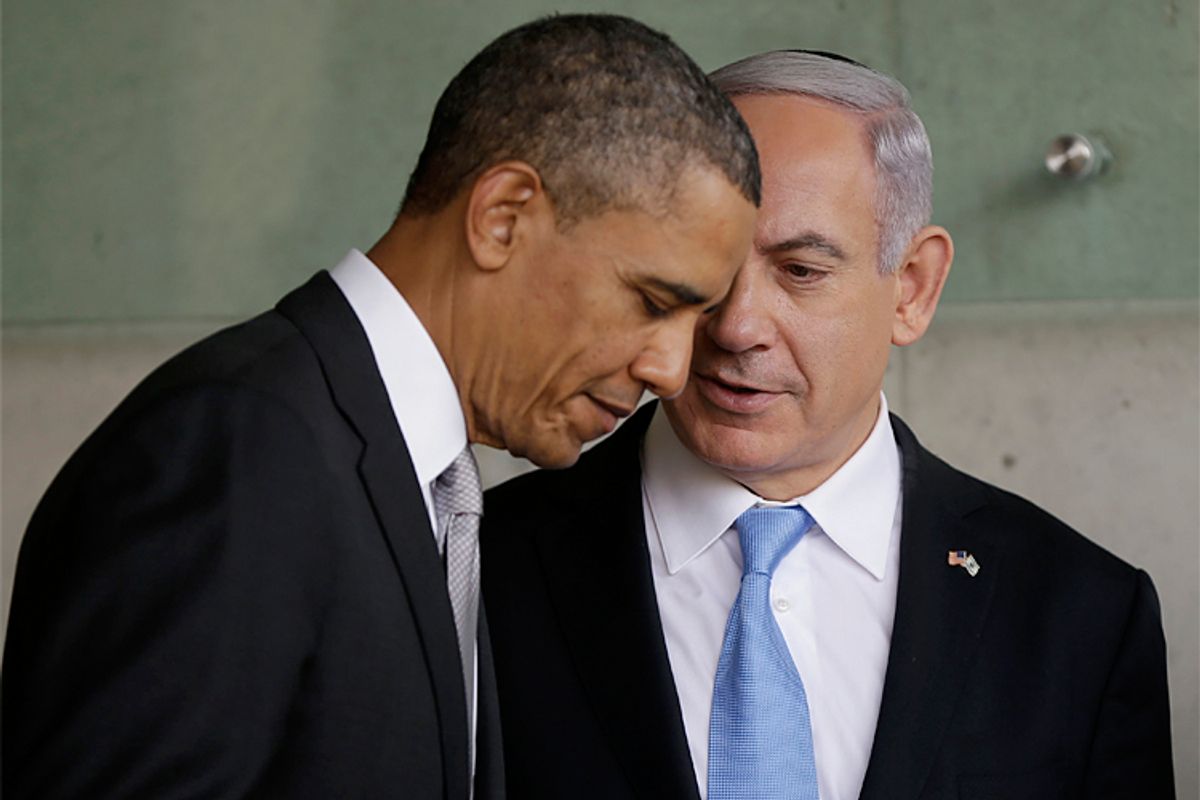 JERUSALEM — It was a moment as nerve-racking as any, even in this area of daily high stakes. In late 2007 the prime minister of Israel, Ehud Olmert, had irrefutable intelligence indicating that his neighbor to the north, Syria, was building a nuclear reactor.
JERUSALEM — It was a moment as nerve-racking as any, even in this area of daily high stakes. In late 2007 the prime minister of Israel, Ehud Olmert, had irrefutable intelligence indicating that his neighbor to the north, Syria, was building a nuclear reactor.
The United States had similar evidence, but when Olmert consulted with US President George W. Bush, who was embroiled in two regional wars as he neared the end of his term, Bush balked.
"Bush said no. He also asked that Israel not do it," recounts Itamar Rabinovich, who is a former Israeli ambassador to the United States and, as former chief negotiator with Syria, one of Israel's go-to experts. "Olmert listened and interpreted that this was a real problem for Bush but that he had to do it, and that Bush knew that. It worked perfectly. If you are head of government and you can understand things between the lines — that is hugely important."
Olmert has maintained absolute silence for the five years since approving what came to be known as Operation Orchard, a surgical Israeli Air Force raid on a rogue Syrian nuclear reactor.
Asked by GlobalPost to confirm or deny Rabinovich's description of events, Olmert said, "I can't deny it."
For Rabinovich, the handling of Operation Orchard is evidence that subtle and deep personal ties between leaders are a crucial component of international relations.
"Chemistry is important, and especially in the relationship between Israel and the United States because, despite the importance of the institutions charged with shaping policy decisions, at the end of the day the head of government is the person making the decisions," he says. "The prism through which the two leaders view one another is very important. For the US president, it is very important to trust the Israeli prime minister, personally."
"This has been lacking," he adds, until now, in the relationship between Bush's and Olmert's successors, US President Barack Obama and Israeli Prime Minister Benjamin Netanyahu.
For two men known not to get along, the first encounter between Netanyahu and Obama on the president's recent trip began with surprising levity and no small amount of attention paid to matters psychological.
Perhaps hoping to make a good impression, Netanyahu lunged forward on the red carpet to shake Obama's hand as he emerged from Air Force 1, leaving Israeli President Shimon Peres, the head of state, to the side. Talya Lador-Fresher, a woman in a beige suit, was left to try and remedy things in front of hundreds of TV cameras. At one juncture she could be heard explaining to the US president, "I am the chief of protocol."
At the same landing ceremony, instructed to "follow the red lines" in order to see an Iron Dome anti-missile battery, Obama joked that it was "some kind of psychological ploy." He added, with clownish thumb aimed at Netanyahu, who has publicly exhorted the president to announce his "red line" regarding Iran's nuclear expansion, "He's always talking about red lines."
To which Netanyahu deadpanned, "It was minutely planned."
How important are these moments of levity and connection? Gershon Baskin, the only man who has negotiated on Israel's behalf with the Islamist group Hamas, says, "I think it is really essential."
"The most important leadership decisions are made by the leader at the top, and the chemistry between leaders is an essential ingredient in relations between countries. I've seen it over and over again."
Baskin also believes that "the last four years between the US and Israel have been marked by sour looks and bad chemistry."
No less important than coming to Israel to speak with the Israeli people, the Obama's stated mission, Baskin says, was "the president's sense of his lack of ability to impact on Netanyahu with things as they were. As important as it was to impact the hearts and souls of Israelis, he needed to turn the page in his personal relationship with the prime minister."
Netanyahu's often clumsy outreach to the United States and his image, in Israel, as a complex figure with a dark and possibly unfathomable mind is the subject of a new book, "Psychobibi: Neurotic King of Israel."
Still, politicians' psychological profile, while a source of fascination for journalists, is as hotly debated as the supremacy of personal chemistry between world leaders.
Defending Netanyahu from charges that personality got in the way of Israel's all-important ties to the United States, Tzachi Hanegbi, a former minister of internal security and intelligence and nuclear affairs, said in an interview with Israel Radio, "Really, it’s policy and strategy, not personalities that define ties between nations."
But almost across the board, people closely involved with affairs of state concede that yes, chemistry matters.
Elliott Abrams, who served as Bush's deputy national security adviser for global democracy strategy when the decision on Operation Orchard was made, asked, "We talk of relations between nations, but how do those take place?"
"Through people," he answers. "And the most important issues are handled at top levels, among individuals who either do or do not understand and trust each other. They know how far each can go, and what genuine political constraints exist. They know what is a fair request, and what is unfair pressure. In all of this personal relations and chemistry is really very important."
Dov Weissglass, who was in charge of negotiations with the Palestinian Authority under former Prime Minister Ariel Sharon, says that in international high-wire diplomacy, personal ties are "significant, just as in every other human interaction."
"It is one of the most important things there is."



Shares